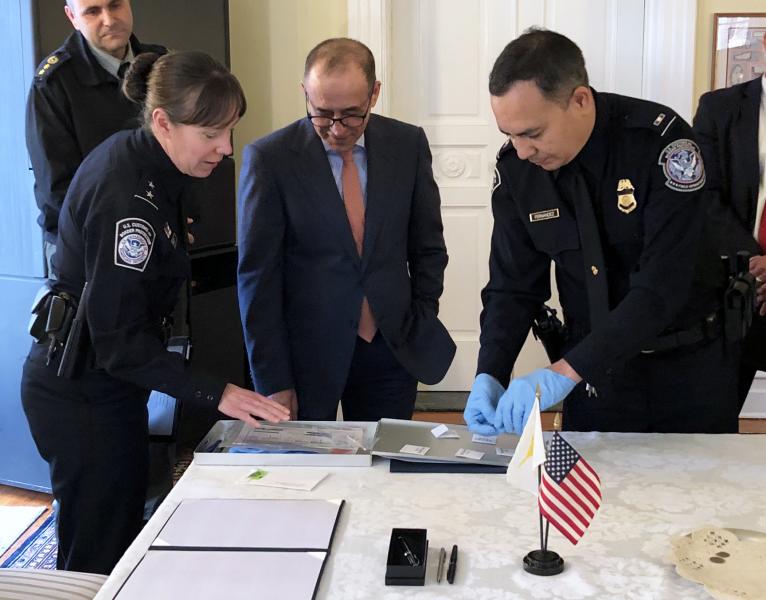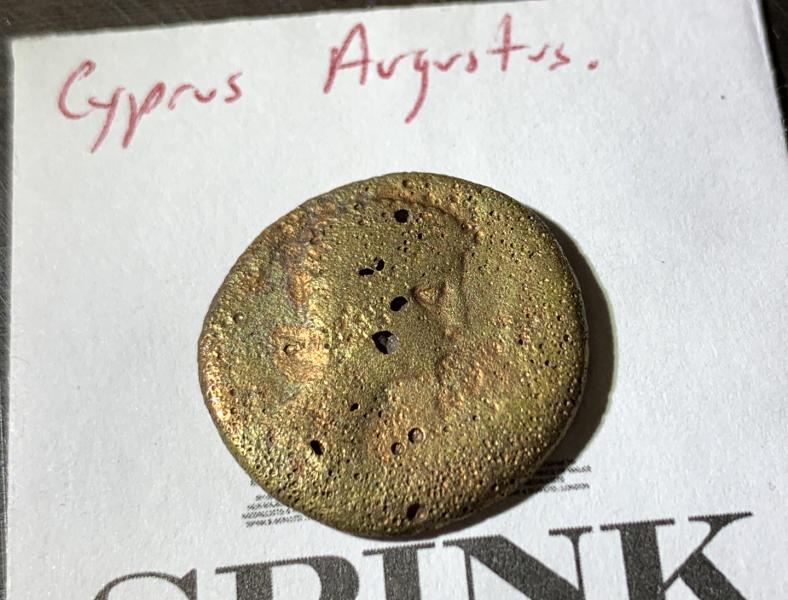Officers detained the antiquities, which dated to 400 BC, in 2009
BALTIMORE – U.S. Customs and Border Protection’s (CBP) Baltimore Field Office repatriated seven ancient coins, dating back to 81 BC, to the Embassy of Cyprus today that Baltimore CBP officers initially discovered in an air cargo shipment in April 2009.

Ambassador Marios Lyssiotis (center)
view the ancient coins Feb. 14, 2020.
An appraisal determined that the collection dated from the Roman Empire, from several periods during 81 BC through 217 AD. The collection includes:
- Two bronze coins from an unspecified Roman period
- One coin from the Ptolemaeus period, 81 BC -58 BC
- One coin from the Augustus period, 27 BC – 14 AD
- Two coins from the Tiberius period, 14-37 AD
- One coin from the Severan period, 193 AD – 217 AD
“On behalf of U.S. Customs and Border Protection, I am honored to return these priceless national treasures to the government and citizens of Cyprus,” said Casey Durst, CBP’s Director of Field Operations in Baltimore. “Customs and Border Protection will continue to use our border authority to identify and rescue precious antiquities being smuggled by those who profit on the theft of another country’s historical and cultural property, and return them to their rightful owners.”
CBP officers from the Area Port of Baltimore initially encountered the ancient coins in April 2009 during an inspection of air cargo that arrived from London. This specific parcel was destined to a coin collector in Missouri.
CBP issued a letter to the consignee requesting any documentation they received from the government of Cyprus authorizing the lawful importation of these cultural artifacts.

Most countries have laws that protect their cultural property, such as art, artifacts, antiquities, or other archeological and ethnological material. These laws include export controls and national ownership of cultural property. Therefore, although they do not necessarily confer ownership, consignees or importers must have documents such as export permits and receipts when importing such items into the United States.
In May 2009, the consignee admitted to not possessing authority from the government of Cyprus to import the artifacts, and CBP officers seized the coins.
Additionally, the parcel contained Chinese coins determined to be from the Zhou, Han and Western Han dynasties, dating from 400 BC through 220 AD.
CBP contracted an appraiser to determine the estimated ages of the artifacts.
The coin collector lost a protracted legal challenge to regain possession of the coins and CBP’s Office of International Affairs coordinated with the government of Cyprus to repatriate the coins during a ceremony today at their Embassy in Washington, D.C.
The Department of Homeland Security enforces the cultural property import restrictions agreed to in bilateral agreements that the United States has concluded with 20 countries and through emergency import restrictions for three additional countries. These bilateral agreements protect cultural property by restricting U.S. import of certain categories of archeological and ethnological material, thus reducing incentive for looting at heritage sites. Read more about these bilateral agreements on importation of cultural property.
CBP recorded 23 seizures of cultural property during 2019 with a domestic value of nearly $1 million. CBP partners with Immigration and Customs Enforcement in the detection, interception, investigation and repatriation of cultural property. Read more about ICE Cultural Property investigations.
CBP officers screen international travelers and cargo and search for illicit narcotics, unreported currency, weapons, counterfeit consumer goods, prohibited agriculture, and other illicit products that could potentially harm the American public, U.S. businesses, and our nation’s safety and economic vitality. Learn about what CBP accomplished during "A Typical Day" in 2019.
Learn more about CBP at CBP.gov.


